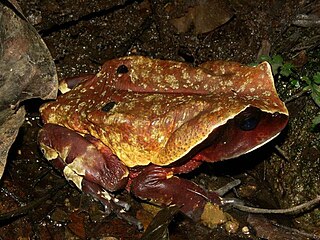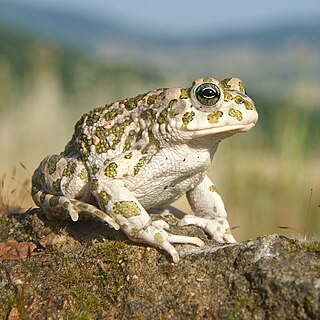
Cardioglossa is a genus of frogs in the family Arthroleptidae known as long-fingered frogs. They are native to western and central Africa, with the greatest species richness in Cameroon. They are found near streams in lowland and mountain forests, but also occur in other highland habitats near streams at up to 2,700 m (8,900 ft) in altitude. These are small frogs with a snout-to-vent length of 2 to 4 cm (0.8–1.6 in). Some of the more localized species are threatened.

Wolterstorffina, also known as Wolterstorff toads, is a genus of "true toads" native to Nigeria and Cameroon. Its sister taxon is either genus Werneria or the clade Werneria+Nectophryne. The name of the genus honours German geologist and herpetologist Willy Wolterstorff.
Cardioglossa melanogaster is a species of frog in the family Arthroleptidae. It is found in the mountains of western Cameroon and eastern Nigeria. Common name Amiet's long-fingered frog has been coined for it.
Cardioglossa pulchra is a species of frog in the family Arthroleptidae. It is found in the Cameroon Range in western Cameroon and in the Obudu Plateau in adjacent eastern Nigeria. Common name black long-fingered frog has been coined for it.

Ansonia spinulifer, also known as spiny slender toad or Kina Balu stream toad, is a species of true toad in the family Bufonidae. It is found in Sarawak and Sabah, northern Borneo (Malaysia), and presumably also in Kalimantan on the Indonesian part of the island.
Rhinella chrysophora, sometimes known as the Rio Viejo toad, is a species of toad in the family Bufonidae. It is endemic to the Cordillera Nombre de Dios on the Atlantic versant in north-central Honduras.

The African giant toad, Congo toad, or Cameroon toad is a species of toad in the family Bufonidae. It is found in Cameroon, Central African Republic, Republic of the Congo, Democratic Republic of the Congo, Ivory Coast, Equatorial Guinea, Gabon, Ghana, Nigeria, possibly Liberia, and possibly Sierra Leone. The toad's natural habitats are subtropical or tropical moist lowland forests, freshwater marshes, intermittent freshwater marshes, plantations, and heavily degraded former forest. While it is a "least concern" species, it is threatened by habitat loss.
Sclerophrys tuberosa is a species of toad in the family Bufonidae. It is found in southeastern Nigeria, Cameroon, southwestern Central African Republic, Equatorial Guinea, Gabon, and northern Democratic Republic of the Congo and Republic of the Congo. Common names rough toad, warty toad, and Fernando Po toad have been proposed for it.

The four-digit toad or dwarf toad is a species of toad in the family Bufonidae. It is found in Bioko, southwestern Cameroon, and southeastern Nigeria. It is the only species in the genus Didynamipus.

The African tree toad is a species of toad in the family Bufonidae. It is found in the West and Central Africa from southwestern Nigeria through Cameroon to Equatorial Guinea, Gabon, and northeastern Democratic Republic of the Congo.
Werneria bambutensis is a species of toad in the family Bufonidae. It is endemic to western Cameroon where it occurs at high altitudes between Mount Manengouba and Mount Oku, including the eponymous Bamboutos Mountains. It is also known as the Bamboutos smalltongue toad and Bambouto torrent toad.
Werneria tandyi, also known as Tandy's torrent toad or Tandy's smalltongue toad, is a species of toad in the family Bufonidae. It is endemic to western Cameroon and known from Mount Manengouba and from the Rumpi Hills. The specific name tandyi honours Robert Mills Tandy, biologist, herpetologist, and wildlife photographer.

Leptopelis aubryi, also known as the Aubry's tree frog and Gaboon forest treefrog, is a species of frog in the family Arthroleptidae. It is found in southeastern Nigeria, Cameroon, Central African Republic, Equatorial Guinea, Gabon, Republic of the Congo, western and northern Democratic Republic of the Congo, and Angola.

Leptopelis millsoni is a species of frog in the family Arthroleptidae. It is found in southeastern Nigeria, Cameroon, the Central African Republic, Equatorial Guinea, Gabon, the Republic of the Congo, the eastern Democratic Republic of the Congo, and northwestern Angola. Common names Niger forest treefrog and Millson's Tree Frog have been coined for it. There is a need of taxonomic revision of this taxon.

Petropedetes cameronensis, sometimes known as the Cameroon water frog, is a species of frog in the family Petropedetidae. It is found in southeastern Nigeria, southwestern Cameroon, and on the island of Bioko. It is the type species of the genus Petropedetes.
Petropedetes palmipes is a species of frog in the family Petropedetidae. It is known from a few localities in southwestern Cameroon, Equatorial Guinea, and western Gabon. Common name Efulen water frog has been coined for it.
Petropedetes parkeri is a species of frog in the family Petropedetidae. It is found in western Cameroon and eastern Nigeria. Records from Equatorial Guinea and Gabon are uncertain, possibly belonging to Petropedetes euskircheni. P. parkeri is named after Hampton Wildman Parker, a British zoologist and herpetologist from the Natural History Museum, London. Common names Parker's water frog and Parker's torrent frog have been proposed for it.
Petropedetes perreti is a species of frog in the family Petropedetidae. It is endemic to Cameroon. It is known from the southern slopes of the Bamiléké Plateau, Mount Manengouba, and Mount Nlonako. Common name Perret's water frog has been coined for it.

Sclerophrys is a genus of "true toads", family Bufonidae, native to Africa and the southern Arabian Peninsula. Originally, all of these species were classified in the genus Bufo. The genus, originally named Amietophrynus, was split due to large enough taxonomic divergence. Ohler and Dubois showed in 2016 that Sclerophrys capensis Tschudi, 1838 is the same species as Bufo regularis rangeri Hewitt, 1935, the type species of Amietophrynus. Because the former name is older, the implication is that Amietophrynus is a junior synonym of Sclerophrys.

Bufotes, the Eurasian green toads or Palearctic green toads, is a genus of true toads. They are native to Europe, western and central Asia and northern Africa; a region roughly equalling the western and central Palearctic. Historically they were included in the genus Bufo and then for a few years placed in Pseudepidalea, which is a synonym of the currently accepted name Bufotes.










